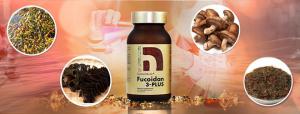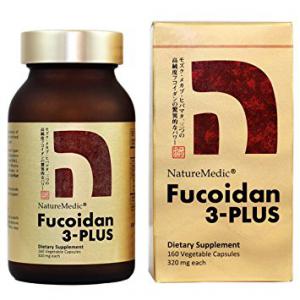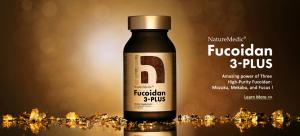Fucoidan (Mozuku, Mekabu & Fucus) may help prevent human papillomavirus (HPV) in adolescents by Dr. Susana Trujillo
Human papillomavirus (HPV) infects about 14 million people, including teens, each year.
Fucoidan’s anti-HPV and anti-cancer properties have the potential to treat both unapparent HPV infection as well as visible clinical diseases. ”
NEW YORK, NEW YORK, UNITED STATES, November 30, 2018 /EINPresswire.com/ -- Human papillomavirus (HPV) infects about 14 million people, including teens, each year. While most HPV infections go away on their own, infections that don’t go away can lead to certain types of cancer. Every year, 32,500 men and women develop a cancer caused by HPV. HPV vaccination could prevent more than 90% of these cancers from ever developing. 1 Still, it is important to note that there are natural alternatives that have been shown to prevent HPV. One of these innovative natural ingredients is known as Fucoidan and it is mainly obtained from the brown seaweeds Mozuku, Mekabu and Fucus. — Dr. Susana Trujillo
Human papillomavirus (HPV) vaccination can lead to substantial reductions in the incidence of HPV infection and HPV-related diseases, including anogenital cancers and genital warts. The introduction of the HPV vaccine in 2006 and the subsequent use of the vaccine in 2008 created opportunities to counter the existing HPV disease burden.2 Given the high rates of HPV infection that occur shortly after the initiation of sex and the vaccine's ability to prevent infection only prior to exposure, HPV vaccination has been particularly targeted to young adolescents. Routine vaccination with either the vaccine has been recommended by the Centers for Disease Control and Prevention's (CDC's) Advisory Committee for Immunization Practices (ACIP) for adolescent females ages 11-12, with catch-up vaccination for young women 13-26 years of age. However, years after the vaccine was introduced, at least half of the target population of adolescent females had not initiated HPV vaccination.9
The CDC reported that many adolescents do not get vaccinated because of lack of HPV knowledge, perception of daughter's risk for HPV acquisition, belief in vaccination benefits, degree of concern about vaccine side effects, child's age, social influences, concern regarding post-vaccination sexual disinhibition, physician's recommendation, and parent's personal exposure to HPV infection.3,4 Considering the morbidity and mortality associated with HPV disease as well as the disproportionately high HPV disease burden in minority and uninsured women within the United States, it is crucial that we continue to provide new options available for adolescents to protect their body from HPV infections.6 Therefore, it is essential to find new alternatives that can provide adolescents a natural option, like Fucoidan, for them to prevent HPV and to enhance their immune system to fight the infection.8
Current research for natural products to be applied in medicine and to promote health has put some emphasis in research on brown seaweeds like Fucoidan. Extensive literature on the health benefits of Fucoidan and its uses has been published since the last decade. However, comparatively, there are only a handful of research papers on Fucoidan and its anti-HPV function. Still, all these studies related to Fucoidan and its anti-HPV properties is very promising.
Fucoidan from brown seaweeds possess good antiviral and anti-tumor activities and some of them have been developed into novel antiviral agents. Fucoidan is a term used to define polysaccharides containing l-fucose found in brown seaweed (Mozuku, Mekabu and Fucus) and the structures of Fucoidan may vary among species and sometimes among different parts of the seaweed. In studies, Fucoidan showed significant anti-cancer and anti-HPV properties.
HPV vaccination provides a strong potential to improve public health by decreasing HPV–related anogenital cancers and genital warts. Despite the increase in vaccination rates, half of the target population continues to remain unvaccinated and completion rates lag in those populations that are at highest risk for HPV disease morbidity. However, improved understanding of the reasons chosen for non-vaccination, including vaccine safety and provider non-recommendation may delay the effort for increase in vaccination rates. Recognizing that timing of HPV vaccination is important and it is recommended prior to sexual exposure, continued alternatives are highly needed to help adolescents prevent additional diseases like cancer.7 It is important to educate adolescents about the importance of having a strong immune system. According to the CDC, the body's immune system clears HPV from 90 percent of individuals who have it within two years. Keeping your immune system healthy can aid the body in getting rid of HPV and Fucoidan is one of the best options to enhance it.9
In summary, Fucoidan’s anti-HPV and anti-cancer properties have the potential to treat both unapparent HPV infection as well as visible clinical diseases. Besides that, Fucoidan has many advantages, such as low toxicity, convenience to ingest and bioavailability, which suggests that Fucoidan may reduce or regulate HPV infection and related cancers.
References:
1. Forman D, de Martel C, Lacey CJ, et al. Global burden of human papillomavirus and related diseases. Vaccine. 2012;30(suppl 5): F12–F23.
2. Centers for Disease Control and Prevention. Number of HPV associated cancer cases per year. Available at: https://www.cdc.gov/cancer/hpv/statistics/cases.htm. Accessed August 10, 2017.
3. Saraiya M, Unger ER, Thompson TD, et al. US assessment of HPV types in cancers: implications for current and 9-valent HPV vaccines. J Natl Cancer Inst. 2015; 107: djv086.
4. Schiller JT, Castellsague X, Garland SM. A review of clinical trials of human papillomavirus prophylactic vaccines. Vaccine. 2012;30(suppl 5): F123–F138.
5. Markowitz LE, Dunne EF, Saraiya M, et al. Human papillomavirus vaccination: recommendations of the Advisory Committee on Immunization Practices (ACIP). MMWR Recomm Rep. 2014; 63:1–30.
6. Petrosky E, Bocchini JA Jr, Hariri S, et al. Use of 9-valent human papillomavirus (HPV) vaccine: updated HPV vaccination recommendations of the Advisory Committee on Immunization Practices. MMWR Morb Mortal Wkly Rep. 2015; 64:300–304.
7. Markowitz LE, Dunne EF, Saraiya M, et al. Quadrivalent human papillomavirus vaccine: recommendations of the Advisory Committee on Immunization Practices (ACIP). MMWR Recomm Rep. 2007; 56:1–24.
8. Kroger AT, Atkinson WL, Marcuse EK, et al., Advisory Committee on Immunization Practices (ACIP) Centers for Disease Control and Prevention (CDC). General recommendations on immunization: recommendations of the Advisory Committee on Immunization Practices (ACIP) (errata in: 2006; 55:1303, Pediatrics 2007;119:1008 and 2007;56:256). MMWR Recomm Rep. 2006; 55:1–48.
9. Centers for Disease Control and Prevention (CDC). FDA licensure of bivalent human papillomavirus vaccine (HPV2, Cervarix) for use in females and updated HPV vaccination recommendations from the Advisory Committee on Immunization Practices (ACIP). MMWR Morb Mortal Wkly Rep.
Dr. Susana Trujillo
Dr. Susana Trujillo
2134788815
email us here
Fucoidan 3-Plus contains high-purity Fucoidan!



